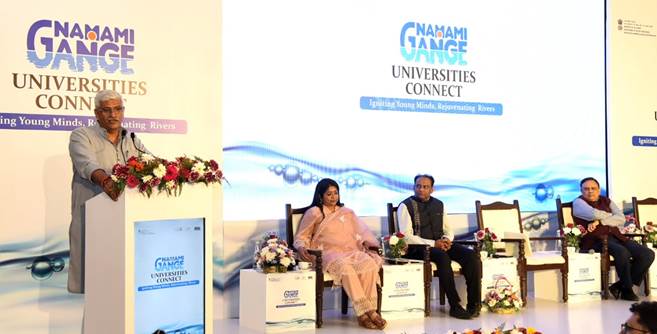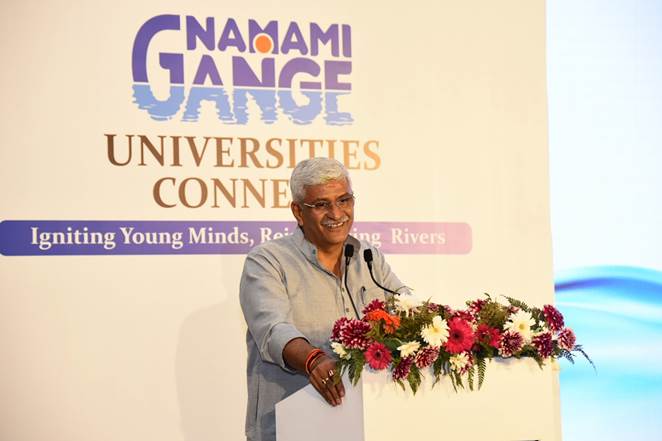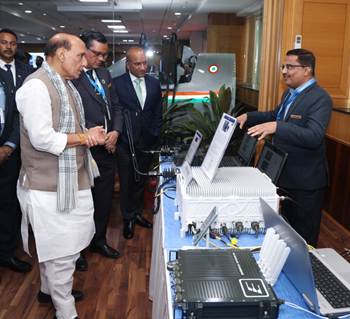
New Delhi: ‘Namami Gange’, which was recently recognised by the United Nations as one of the top ten ‘World Restoration Flagships‘, today signed a Memorandum of Understanding (MoU) with 49 universities to inspire youth towards water conservation and river rejuvenation. The agreement would bring students to the forefront of the mass movement for creating a sustainable ecosystem of the rivers.
The agreement was signed in a ‘Namami Gange: Universities Connect’ event presided over by Union Minister for Jal Shakti, Gajendra Singh Shekhawat. The theme of the event was ‘Igniting Young Minds, Rejuvenating Rivers’. Apart from seeking active public participation, the event focused on creating knowledge-based short-term programmes, and training sessions, and fostering more research on the water sector.
Shekhawat asserted “Water is not just an important factor or commodity but no life can be imagined without water and that makes effective water management absolutely essential”. He stated that ensuring the cleanliness and purity of River Ganga with the rejuvenation of rivers are the prime objectives of the Namami Gange Mission. “Water is a crucial factor to sustain life. India’s cultural history saw water as the holiest source that sustains life in all forms, and over time that culture has eroded. We as a society have an immense responsibility to revive that culture,” he said.

The Union Minister pointed out certain impacting factors on the development of children including parents, who, in the Indian tradition, used to talk about various aspects of life including nature, culture, country, and duties. Teachers, he said, also play an important role in creating an impact on the children and, therefore, it becomes, imperative for the teachers to inculcate respect towards natural resources as per our traditional wisdom and practices through educational frameworks.
Shekhawat also stressed the need for coming together of celebrities, media, judiciary and other members of civil society to start discussing and debating issues related to natural resources, especially water, to make India a “water wise” country. He suggested organising debates and other competitions in the universities to spread awareness of the importance of water conservation and river rejuvenation and urged the leading educators to strive to make their campuses green and water efficient.
Pointing out that the agriculture sector uses the bulk of India’s water resources, he said that demand-side management was the need of the hour. “The world is appreciating us and India has invested more than 240 billion dollars in the water sector but the challenge in front of us is also enormous and we must all play our part in contributing to conserve water and increase water use efficiency,” he said, adding, “We are not the owners of our natural resources but only custodians and it is everyone’s duty to return to the future generation as we inherited from our forefathers,” he said.
In the context of the collaboration between Namami Gange and academic institutions, G. Asok Kumar, Director-General of the National Mission for Clean Ganga (NMCG) said that it was a move forward in the direction of ‘Gyan Bhagidari’ (sharing of knowledge).
He said that the MoU signing represented collaboration on areas in pursuit of academic excellence in the field of water quality, environmentally sustainable development to public outreach, and a step towards creating an enabling environment for the provisions of Arth Ganga. He also drew similarities between the Jal Shakti (power of water) and the power of the youth, “both of which could go astray and wreak havoc if not channelized in a proper way”. He said that India needs more social skills, technology solutions, and data management to make further strides in the water sector.
Additional Secretary and Mission Director, National Water Mission, Archana Varma noted that 3 out of 4 jobs in the world are related to water, and if water becomes scarce, there looms a threat of unemployment for the masses. She emphasized the importance of dialogue and people’s participation to involve younger generations in the water sector.
– global bihari bureau





